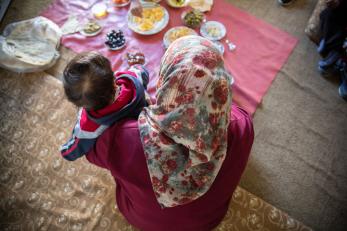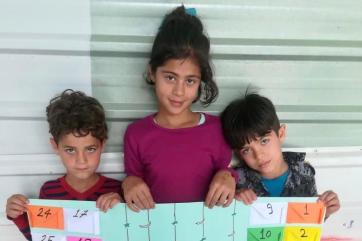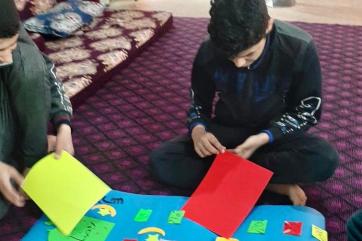Increased isolation, stress and uncertainty takes a toll on psychosocial wellbeing

Life in Jordan’s refugee camps is quieter than usual — except in the bread distribution queue where the wait can last hours. Since March 21st, permits to leave or enter the camps are suspended, with access only given to health and sanitation workers. Schools and extracurricular activities such as sports and art remain closed.
Families are adjusting to new routines at home together, but not without effects on their psychosocial wellbeing. One of the mothers we spoke with in Azraq camp said that all eight of her children are using her mobile phone to access online education and with unreliable access to the internet, it is causing a lot of stress and tension within the family.
Mercy Corps has been working with families in the camps since they have first opened. Through the Ishrak program, we are providing creative ways for caregivers and children to connect, play and build positive relationships. The ultimate goal — to build family resilience to stress and create an environment in which all children are protected and able to thrive.
While our program certainly looks different now, we have been able to continue delivering much needed activities remotely. Check out this video to see how we’ve maintained relationships from afar.
Through two WhatsApp groups — one for female caregivers and one for males — we provide methods and activities for positive parenting as well as different exercises to help parents and children cope with increased stress, all rooted in cognitive-behavioral therapy approaches.
Throughout, we share simple and accessible COVID-19 prevention messages that have been approved by UNHCR, the WHO and Ministry of Health.
Caregivers were eager to participate in the groups as they considered it a safe space to express their thoughts, concerns and challenges.
“This group is like a support channel for us as mothers to learn from each other and gain new skills,” one participant shared. Another father mentioned that the group activities were a great opportunity for his family to work collaboratively and spend quality time together.


We quickly realized the opportunity to expand our reach and include activities for young mothers — women who experience high levels of isolation and limited mobility in normal times. While we’ve been conducting sessions for young mothers in our center and through home visits for years, connecting these mothers virtually through WhatsApp groups will allow us to reach more of the most isolated mothers and provide a safe space for them to interact with their peers.
A constant line of communication with our program participants help us make decisions based on their needs and feedback. We remain flexible — as the context and needs adapt, so will we.